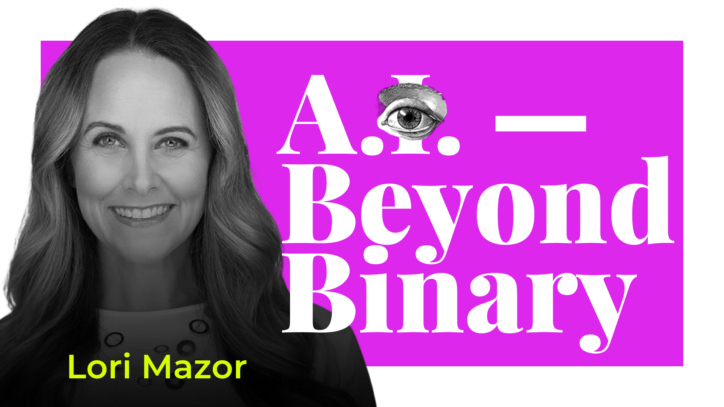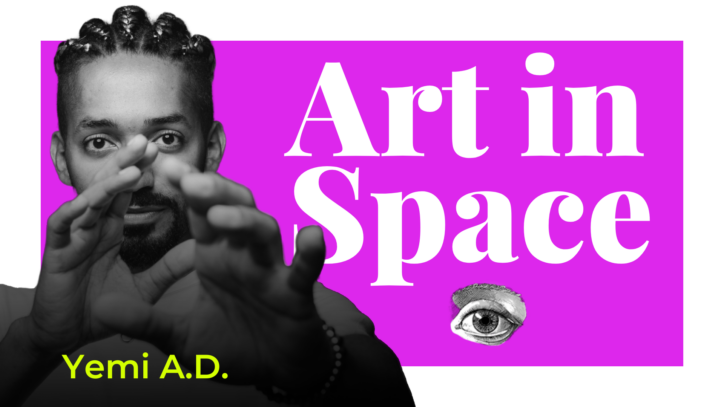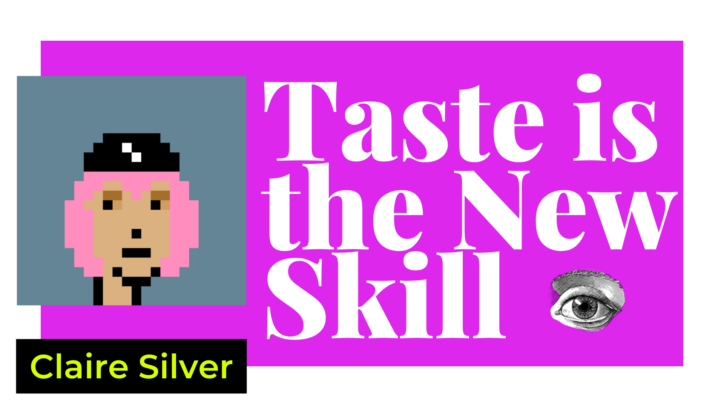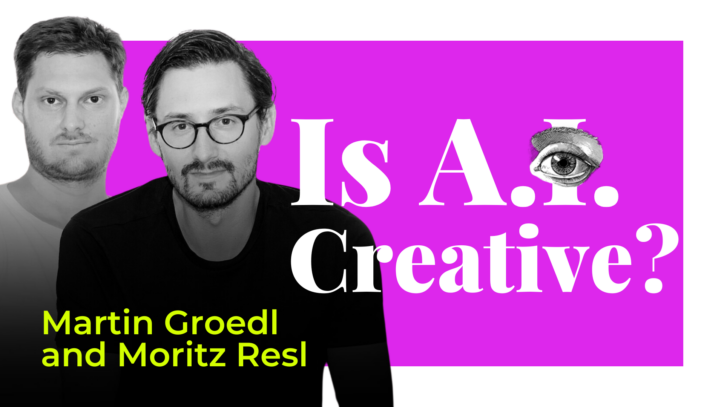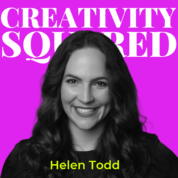
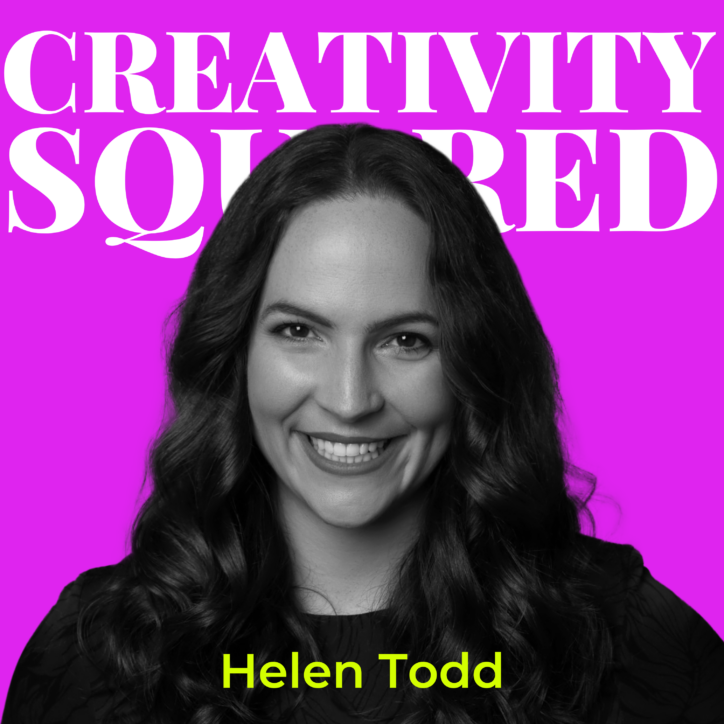
Ep66. A.I., Creativity & Freedom: Are Creativity and Freedom Inextricably Linked? Creativity Squared Host Helen Todd Answers Listener Question
Are creativity and freedom inextricably linked?
In today’s episode, Creativity Squared host Helen Todd answers a listener’s question on the relationship between freedom and constraints in the creative process.
As we enter the Imagination Age, please accept this as your invitation to play in the playground of possibility. Exploring this brave new world requires nuanced conversations around what it means to be human and what this collective future we’re co-authoring together looks and feels like. We need human creativity and imagination now more than ever to break free from the patterns of the past that no longer serve us. And that’s why we’re diving into this listener question.
In this episode, we’ll explore:
- Does creativity flourish more with scarcity or with freedom?
- Can A.I. or GenAI match human creativity?
- How are artists collaborating with personal language models?
- What does Burning Man have to do with this?
Tune in now to gain valuable insights as Helen reflects on thought-provoking conversations with previous Creativity Squared guests Harry Yeff (Episode 1), Jason Schneider (Episode 23), Martin Groedl and Moritz Resl (Episode 32), Claire Silver (Episode 34), Yemi A.D. (Episode 49), and Lori Mazor (Episode 52).
What are your reactions, thoughts, comments and/or questions on this topic or any other at the intersection of A.I. and creativity? Share through our Contact Us page — your feedback may be featured in a similar episode in the future!
Links Mentioned in this Podcast
- Creativity Squared Ep1: Harry Yeff
- Creativity Squared Ep23: Jason Schneider
- Creativity Squared Ep32: Martin Groedl and Moritz Resl
- Creativity Squared Ep34: Claire Silver
- Creativity Squared Ep49: Yemi A.D.
- Creativity Squared Ep52: Lori Mazor
- The AI Dilemma
- Wil Reynolds on the Sea of Sameness
Continue the Conversation
Thank you for joining us on this special episode of Creativity Squared.
This show is produced and made possible by the team at PLAY Audio Agency: https://playaudioagency.com.
Creativity Squared is brought to you by Sociality Squared, a social media agency who understands the magic of bringing people together around what they value and love: https://socialitysquared.com.
Because it’s important to support artists, 10% of all revenue Creativity Squared generates will go to ArtsWave, a nationally recognized non-profit that supports over 150 arts organizations, projects, and independent artists.
Join Creativity Squared’s free weekly newsletter and become a premium supporter here.
TRANSCRIPT
[00:00:00] Helen: So I don’t think AI is going to kill creativity. I don’t think abundance is going to kill creativity. If anything, right now, we need human creativity and imagination to really explore what does this age of imagination look like and how can we use AI to empower individuals and really live up to the promise of AI helping to amplify the best of human potential.
[00:00:35] Helen: Welcome to Creativity Squared. Discover how creatives are collaborating with artificial intelligence in your inbox on YouTube and on your preferred podcast platform. Hi, I’m Helen Todd, your host, and I’m so excited to have you join the weekly conversations I’m having with amazing pioneers in the space.
[00:00:53] Helen: The intention of these conversations is to ignite our collective imagination at the intersection of AI and creativity to envision a world where artists thrive.
[00:01:09] Helen: Hello and welcome to Creativity Squared. Today I’m mixing things up just a little bit, and instead of our regularly scheduled interviews, I’m answering one of your questions at the intersection of AI and creativity. You’ll definitely wanna tune in to next week’s show, though, as we have a special interview.
[00:01:29] Helen: I have a guest co-host with me, Joanna Peña-Bickley. She’s actually the featured guest in episode four and is just amazing and fierce in all aspects of life. Within technology, she’s one of the mothers of Amazon’s Alexa, the mother of cognitive experience design AI first company right now called Vibes AI.
[00:01:52] Helen: Together, we interview Dinesh Maheshwari, who’s a humanist entrepreneur, advisor to many startups, and also the chief technology advisor to Grok. Together, the three of us explore what it means to be human in the age of artificial intelligence. You’ll definitely want to tune in to that conversation. For today’s show, we’re going to explore a question around the topic of creativity and freedom.
[00:02:18] Helen: It’s a question from Mark Williams on Facebook. And first and foremost, a big thank you to Mark and everyone who listens to the show and especially those who give me your feedback, whether that’s through social media messages, DMs, text messages, emails, messages through the site. I’m not always the best at responding quickly, but I really do read everything and appreciate all of the feedback and comments.
[00:02:44] Helen: And if you haven’t already, do sign up for my free weekly newsletter, just by visiting CreativitySquared.com; the podcast and newsletter comes out every Thursday. So I had written a post, teasing one of Creativity Squared’s free weekly newsletters, and in the social media post, I wrote that creativity and freedom are inextricably linked.
[00:03:09] Helen: And I want to share the comment that Mark wrote. He wrote, “I know that Facebook is not the place to have nuanced discussions, and I’m not trolling ya, I promise.” So before I continue reading, I just wanted to comment. One, I completely agree that just in general, whether it’s social [media] or even in person, we’re not having enough nuanced discussions in general or holding space to have opposing views, and it’s so needed more than ever right now for so many reasons.
[00:03:42] Helen: But one is [that], no one’s got it figured out [or knows] what’s going to happen, especially with this massive AI revolution. It’s going to impact all facets of our lives. No one has all of the answers. And one of the reasons for the show is for you all to learn along with me and figure out what this imagination age that we’re entering, what does it look like and what does it mean for all of us?
[00:04:07] Helen: I invite you to challenge me and my views, and I’m always open to constructive criticism. Like it’s a brave new world that we’re entering and we need to have nuanced conversation and different viewpoints and new ideas. I just want to say we need this so much. And I invite this type of conversation onto the show because you know, we explore the good, the bad and everything inbetween when it comes to AI technology, especially at the intersection of creativity.
[00:04:37] Helen: So you will never hurt my feelings by giving a, you know, thoughtful feedback on your perspective. I want to hear everyone’s perspective from the kaleidoscope of perspectives that are out there. Okay, so back to Mark’s comment, he writes, “but I disagree strongly with the core premise.”
[00:04:55] Helen: And again, the core premise is that I wrote that creativity and freedom are inextricably linked. And then Mark writes. “I believe that creativity and limits are inextricably linked. It’s easy to create when there are no restrictions or limits and one has total freedom to do whatever one wants. When time, money, resources, and freedom are in short supply is when creativity is spurred the most.
[00:05:24] Helen: We could have a fun discussion on the topic. I’ll maintain that creativity flourishes in scarcity and oppression. More than it does in abundance and freedom. AI is a case in point. I don’t believe we’re seeing more creative artists over the past 10 years, but we are seeing more content creators who use automated tools that are based in what is popular to make content that in turn becomes popular because that’s what the algorithm has determined is already popular.
[00:05:52] Helen: That’s not creative, in my humble opinion. Creativity,” Mark writes, “in my mind gives us a fresh or new look at what is popular and accepted. While CGI in movies felt like a creative step forward 10 years ago, it’s led to a homogeneity in film now that is neither nor emotionally engaging and has led to shorter attention spans.
[00:06:13] Helen: I’m curious, and looking forward to following to see where you go with this premise.” So again, thank you, Mark. I appreciate this feedback and today’s episode is going to be a continuation of this conversation. So diving in, there’s a lot to unpack in what Mark wrote, and I want to give some context to where I got that from.
[00:06:34] Helen: But first and foremost, I don’t disagree with Mark and I actually called Creativity Squared philosopher and resident, we’ll call him Jason Schneider, to get some of his feedback too, as I was thinking about this episode. And one thing that Jason said is like, “there’s not really one right answer because all of these different things, creativity, freedom, they all mean to different people.
[00:06:58] Helen: And there’s not one right answer.” But I don’t disagree with Mark. In fact, one of my favorite little stories about creativity is one of constraints. I have yet to figure out where I originally got this from, but I know I’ve said it in a few previous interviews that, you know, one of the problems that AI does solve for is that blank page problem.
[00:07:20] Helen: We’ve all experienced that, whether it’s a blank page to start writing, whether it’s a novel or a blog post or, you know, a composition or a painting, whatever it is, it’s like, where do I start? And then AI helps solve that answer as a brainstorming tool to get some of those initial ideas onto paper, so to speak.
[00:07:39] Helen: But one of the stories is, kind of along those lines, of a composer was told to write a composition and the composer was like, “I have no inspiration. I can’t pull a composition out of thin air.” And then whoever was asking the composer to write a piece said, “well, picture walking in to a bar and there’s a gorgeous woman in a red dress sitting on a bar stool and she’s a little too tipsy and falls off the barstool.”
[00:08:12] Helen: And then the composer is like, “ah, now I’m inspired” and is, you know, writes the composition. And I always thought that was kind of a cute story about the blank page and giving some limits or some framework, for creativity to flourish. You know, it’s come up a lot of different times on the show, but one episode that I could also point people to is with Lori Mazur.
[00:08:36] Helen: She actually wrote a book exploring the intersection of AI and creativity. And really where it comes, whether it’s the LLMs or our human creativity, it all falls between control and chaos where the creativity flourishes. And in her mind, and what she presents in the book and what she says in the interview too, is that there’s actually an art to rules in whether it’s the rules that we apply to ourselves and the creative process or in working with the LLMs as well too.
[00:09:10] Helen: And for those who are new to the show, LLMs are the large language models, the Chat GPTs and the generative AI tools, chatbots out there. I know sometimes I can jump into a little jargon out the gate, but that’s a really interesting interview that explores this topic a lot more in depth as well. And the art of the rules around the creative process, which is very interesting.
[00:09:34] Helen: Before going back to the conversation with Mark, I wanted to share where I got that seed planted for the social media posts that I did, and it came following an interview in episode 49 with Yemi AD, and he’s an incredibly multifaceted artist, and he planted the seed in my head with this quote, and we’re just going to actually let you listen to him from episode 49 right now.
[00:10:03] Yemi A.D.: So creativity, because this is like my biggest topic, is, I’m traveling around the world and trying to teach about creativity to kids in order to step into their creative potential and to shape future and to shape their environment and to shape their life. You know, not to be just in that circle of how their parents were doing and how their country is doing. Just really create something new.
[00:10:26] Yemi A.D.: And then also I do it with companies to speak to boards and to, you know, to infuse innovation culture and, you know, and it, and the creativity is connected to freedom and to ability to really get away from the patterns of the past. Otherwise, we are really, really good in the recycling the past and placing it ahead of us like it’s something new, but it’s nothing new.
[00:10:55] Yemi A.D.: If you look these hundred years, it’s very similar to last hundred years, right? The last hundred years in the 1900s, we had in the first 20 years, we had a Spanish flu. So 50 million people died. It was a pandemic. Then we had the first World War, you know, and now we are in a very, very similar spot.
[00:11:16] Yemi A.D.: So, I say the toys have changed. The environment may be changed a little bit, but the issues are still the same. So that’s kind of sad, to me. So I think creativity and freedom and why, because if you’re not free, you just using creativity to recycle the past. And if you really kind of question your freedom, and step into being really open to new scenarios, that’s the way to go.
[00:11:44] Helen: So that was Yemi. That clip is from the full interview, which I really recommend if you haven’t listened to it yet, I could listen to Yemi speak for days on end. But one thing that he said in this quote that really stuck with me and I kind of marinated on it after the interview a lot was that, “creativity is connected to freedom and the ability to get away from the patterns of the past.
[00:12:09] Helen: If you’re not free, you’re just using creativity to recycle the past.” And I want to give you a little bit more context on to Yemi if you didn’t listen to that episode or just need a refresher. He’s such a fascinating guy for so many reasons, but one, he was born into communism in the eighties, in Czechoslovakia, which was under Soviet rule.
[00:12:29] Helen: So he’s Czech Nigerian. And at four years old, his father, his Nigerian father left to visit his family in Nigeria and couldn’t return back home due to a revolution and closed Czech borders. Yemi, much later in life would be reunited with his father.
[00:12:47] Helen: Interestingly, Yemi wouldn’t meet another black kid until he was about 15 years old. So he grew up in a super, in his own words, white monochromatic community. And I shared this just because it influences Yemi’s thinking about freedom and creativity and in the creative process. So in reflecting on, you know, Mark’s pushback and stuff and the, where does freedom fall into the creative process?
[00:13:17] Helen: I would say that Mark is almost at the execution level of the constraints that we put around the execution of creative ideas where Yemi is really speaking to freedom of thought, regardless of your circumstance, and clearly different environments, support much more creative thought than other environments, whether as in Mark pointed out, oppressive or not oppressive.
[00:13:44] Helen: I think freedom of thought is really what Yemi is speaking to when he discusses freedom and creativity. And, you know, he expands on it a lot more in the quote that you just heard. And, you know, I think what Mark pointed out was that the old saying, “necessity is the mother of invention,” like, [thoes] constraints do lead to creativity and, you know, I will be the first to tell you that time constraints will get some of my best work out of me sometimes, but I’m definitely curious what your thoughts are, related to this.
[00:14:21] Helen: One thing that Yemi really speaks to too, is using creative thinking to get out of patterns from the past. And I think we’re zooming out a little bit to think more about, you know, bigger societal implications and whatnot. In this moment in time, I think we need creativity and imagination more so than ever before.
[00:14:44] Helen: I’ve said before, and I’ve got a talk that I give on farewell, the information age, welcome to the imagination age. And we’re really entering a whole new era that it’s really the power of your idea that’s going to be the most valued creation. We’re at a place or very soon to be a place where if you have an idea and can communicate it, you can bring it to life with the power of AI, whether that’s text to text, text to image, we’re seeing really high fidelity text to video, we’re going to be doing text to code or no code.
[00:15:21] Helen: We’re going to be game makers, developers, world builders, regardless of, you know, school location or equipment like film equipment, which can be very cost prohibitive, for some people, to bring their ideas to life. And one thing that came up in the episode with Lori Mazur too, is that, you know, just because you have a flood of ideas, it doesn’t discount good ideas.
[00:15:46] Helen: It actually puts pressure or not pressure, but the good ideas will actually surface more to the top, just in a sea of ideas. And Will Reynolds, who was a speaker at the marketing AI Institute in Cleveland that I also spoke at, he talks about the sea of sameness, where it’s so important in this day and age to have a perspective and new ideas to really stand out, especially with everyone using, generative tools. So I, share that, in that human imagination is so important right now, and we’re entering a very scary and disruptive time. But that also means that there’s so many opportunities to write and co-author this new chapter together.
[00:16:30] Helen: And going back to what Yemi said of, what patterns of the past are we going to recreate or not going to recreate? Have we given ourselves the freedom to think beyond what our current circumstances, show is possible? And I think this is where the human creativity gets really exciting because with so much disruption is also so much opportunity and right now, so many conversations around AI is very doomsday, gloomy, dystopian, which there are very, valid concerns around the, the safety of AI and its implications for society. I highly recommend, it’s an hour talk on YouTube called the AI Dilemma. We featured it on our blog I believe, if you go to CreativitySquared. com, you can also learn more about it there.
[00:17:22] Helen: So there’s a lot of valid, valid concerns about the issues with AI and the negative implications for society. That said, where are we going with AI? What’s the positive vision? How do we want AI to actually amplify the best of human potential? What does that look like? And I think we actually need more of those types of stories right now and vision of where we’re going than what dominates the current discourse around AI.
[00:17:52] Helen: A few other things that I wanted to say, to this too, you know, in thinking about the age of imagination or the imagination age, one of the things that you hear, especially from the, we’ll call them the techno optimists, Sam Altman has said this on stage a few different times of like, that we’re about to enter like unimaginable abundance and like, what does that look like?
[00:18:19] Helen: And it’s hard to kind of wrap our heads around something that hasn’t come yet and I’ve said this many times on stage before too, it’s almost like at the end of the 1800s, early 1900s, where the main mode of transportation were horses and carts. And then if you imagine someone coming from three decades later, or even two decades, it happened very quick from the horse and cart buggy stage that all future transportation was going to be by gas cars.
[00:18:49] Helen: Like, if you only know, carts and horses as your mode of transportation, imagining that which does not exist; it’s really hard to imagine. And we’re kind of at that horse and cart stage right now of what’s on the other side?
[00:19:03] Helen: But it begs us to actually imagine what’s on the other side and invites us, like, what do we want it to look like? What do we want to co-author together for this? To Mark’s point about the generative AI not being creative. We’ve explored this topic on the show a lot. I think one before the winter break last year, the title was Are Machines Creative.
[00:19:26] Helen: And in that episode with Martin and Moritz, they’re like, in some regards, yes, if creativity is just bringing two ideas together that haven’t been brought together before, but the, deeper intuition, which, right now is a uniquely human trait. The machines can’t do that. Or, you know, higher level or order for lack of a better word, creative thinking, like the machines can’t do that and they can’t evaluate if an idea is good.
[00:19:52] Helen: And I hear that a lot, actually, that the machines can’t evaluate if ideas are good, I actually disagree with that because that’s one prompt away of having an expert critic, an expert in dahdahdah, or cross referencing customer reviews or whatever feedback already exists to use as a filter to test if an idea is good or not.
[00:20:15] Helen: I mean, look at Netflix. They have the, the algorithm figured out for what’s going to work. Now, what works and what’s a good idea, you know, on Netflix, you know, that’s a different conversation for a different day. Very subjective on what a good movie is, but I will say commercially successful if that’s one measure. Algorithms already do that.
[00:20:36] Helen: And I think it’s a prompt away, when it comes to the machines having tools at their behalf that can evaluate ideas with or without humans in the loop. So I’ve thought this a few different times and I haven’t said it aloud yet. So you’re getting that little, that hot take, but in the sense of circling back to – thank you for following my squirrel brain too, and jumping all around – but going back to, is Gen AI creative by itself?
[00:20:57] Helen: I tend to lead more into the human creativity is unmatched and is uniquely human. Lori Mazur said something, one of the more provocative things on the show that she actually thinks that It’s an advanced math problem to get the machines as creative in the entirety that humans are creative, that she wants to go back to MIT labs and figure it out in the next 10 years or something.
[00:21:33] Helen: So we’ll see if that prediction happens, but having got to talk with Dinesh, who’s going to be featured in next week’s episode, and just through a lot of conversations on the show, you know, there’s so much to the human experience that isn’t replicated in these machines, how we absorb the world, our learning isn’t narrow or singular in the way that a lot of the training for advanced and recursive as AI can be, doesn’t encompass the entirety human existence and how we absorb and learn the world.
[00:22:09] Helen: And that plays into our ability to be creative, as well. And we’re starting to see transhumanism of machine and biology interwork in interesting ways. I think with that, absolutely, ‘cause the human is not in the loop, but built into the technology somehow. We’ve got, Neuralink with the BCI brain computer interface chip already in a brain.
[00:22:35] Helen: You know, having tools like this augmenting humans is nothing new. But the emergence with the brain and using thoughts for prompts and controlling things is very, very new, and as that space evolves, it will be really interesting to re-explore this question for sure. But back to Mark’s point about the gen-AI, tools or AI not being very creative.
[00:23:01] Helen: I agree with him in that sense. I think where the thing, where AI gets interesting for a language model standpoint, is actually when it’s personal language models that are built on the corpus of work of the artists themselves, instead of, you know, whatever’s been scraped on the internet, which that we’ve explored this topic on the show a lot too, is not the best route morally and the courts will, you know, decide whether it’s legal or not, over the coming years, but one way that artists can really take back control and leverage the power of AI is through personal language models that are built on the corpus of their work.
[00:23:43] Helen: One episode that I highly recommend on this topic is the one with Claire Silver that kicked off season two. She built a model on her own works, so she’s sparring more or less with herself. Very first episode with Harry Yeff, his stage name is Reeps One. He’s a world renowned beat boxer and voice technologist. And he got the opportunity to beat box with an AI with his own voice. And he said something in that episode that I’ll never forget, [it] was such a mic drop moment.
[00:24:16] Helen: I asked him, I was like, “you know, Harry, from the seat that you sit,” I mean, he’s world renowned beatboxer, “is competing with yourself through AI; is this the hardest challenge to date?” And he said something along the lines of “Helen, we’re all our biggest competitors,” you know, mic drop moment right there. So I think about this a lot because, you know, humans [are] forgetful.
[00:24:40] Helen: We have this recency where, you know, if I’m talking to you, I’m probably going to be talking about the most recent episodes or the standout ones and not like the full corpus of my entire work, that I can just, you know, access at the tip of my fingers, or tip of my tongue or, you know, whatever the analogy is.
[00:24:58] Helen: So I think about that a lot of AI and it’s come up so much on the show, especially with our interviews with the artists where when they start sparring with their own artwork and sparring with themselves in some way, with these LLMs, that unlocks a whole new creative process that’s really exciting.
[00:25:18] Helen: So I recommend the episode with Claire Silver and Harry Yeff, to listen to those two specifically, how they do it and how it pushes themselves further, to be more creative working with their own work. So that’s one thing that, you know, when anyone like really critiques AI and gen AI, I think it’s usually really done, through like thinking about the Chat GPTs of the world that have scraped the internet.
[00:25:48] Helen: But there’s so many more uses, even with those type of bots from a personal language sense that I get really excited about. I haven’t built a custom bot yet with all of the material from Creativity Squared, but that’s on the works. So I can easily, you know, “what was that episode? Who said that?” You know, “what quote is that? What topics should I dive more into?”
[00:26:12] Helen: You know, start playing with the work on the show more, which I think is really exciting. Oh, and something else I wanted to say about, what Mark said, tied to the theme of creativity and limitations, “easy to create when there are no restrictions or limits and one has total freedom to do whatever one wants.”
[00:26:30] Helen: So Mark wrote that. And, you know, in some ways it’s funny because the blank page problem is something that happens all the time. So having the limitations, you know, helps with that. But to the point of that, you need restrictions in order to be creative, one thing I think that’s interesting about this in this moment in time is going back to the age of imagination.
[00:26:53] Helen: And what Sam Altman said of, you know, if we’re going to experience unimaginable abundance, what does creativity mean in that space? If I understand how Mark would argue that, in complete abundance, you don’t have creativity and it’s not needed. And to me, that doesn’t make any sense whatsoever. You know, I actually don’t think creativity needs conditions, whether limitations or non-limitations for the magic of creativity to happen.
[00:27:24] Helen: But I think about like a place like Burning Man, which I’ve got to go to, goodness, three or four times. And it’s a place that is non commercial on the actual playa. You spend and waste a ton of money and stuff, you know, getting ready for Burning Man. But winter actually on Black Rock City, the city that emerges for the Burning Man Festival, there’s no money and it’s just complete expression, and, and art everywhere from what people wear the costumes and the outfits, art cars, the camps all have themes, sculptures and art in the desert, like everywhere there’s art.
[00:28:10] Helen: And it’s really an abundance of art with no monetary economics to it. And I think it’s an interesting model to think about. It’s almost like with everyone being creative to have the best art car. It’s like, you have to have the best idea, which I think goes back to Lori Mazur’s point of when, you know, everything’s creative, nothing’s creative to a certain extent, but what she would say is like, it actually elevates the really good ideas.
[00:28:37] Helen: So I don’t think AI is going to kill creativity. I don’t think abundance is going to kill creativity. If anything, right now, we need human creativity and imagination to really explore what does this age of imagination look like and how can we use AI to empower individuals and really live up to the promise of AI helping to amplify the best of human potential.
[00:29:04] Helen: So those are my thoughts. I fully agree with Yemi, that we need freedom of thought and that freedom and creativity are inextricably linked. And I agree with Mark that having restraints, also is really important in the creative process, especially people who flourish with constraint in their approach, to their creative process.
[00:29:29] Helen: You could probably look at this a hundred different ways and ask a hundred different people and get a hundred different answers. But I think it’s very interesting. And we’re going to keep exploring this question on the show and have more nuanced conversations and debates. So I’m very curious what your thoughts are, your reactions, where you land on creativity’s role related to freedom and limitations or constraints.
[00:29:56] Helen: Let me know if there’s another question that you’d like me to do an episode like this, me rambling on. Let me know. And I’d be happy to hop back on, you know, one thing that’s kind of funny about podcasts is it is a little asynchronous where I love meeting up with listeners who like, “Oh, I listened to this episode and wanted to talk to you about this and this,” where each episode really sparks and opens conversations, which I hope it does outside of just with me, but I always love hearing from listeners who want to talk about an idea that was spawned or something that they had been noodling on, from the show itself.
[00:30:35] Helen: So hopefully this will give you some more food for thought as we’re navigating this fun and exciting and terrifying and fantastical world of AI together. So tune back in next week. We have an amazing interview with Dinesh and Joanna and a [lot] lined up for the fall. So thank you and we’ll see you next week.
[00:30:59] Helen: Thank you for spending some time with us today. We’re just getting started and would love your support. Subscribe to Creativity Squared on your preferred podcast platform and leave a review. It really helps and I’d love to hear your feedback. What topics are you thinking about and want to dive into more?
[00:31:15] Helen: I invite you to visit CreativitySquared.com to let me know. And while you’re there, be sure to sign up for our free weekly newsletter so you can easily stay on top of all the latest news at the intersection of AI and creativity. Because it’s so important to support artists, 10 percent of all revenue Creativity Squared generates will go to ArtsWave, a nationally recognized nonprofit that supports over 100 arts organizations.
[00:31:40] Helen: Become a premium newsletter subscriber or leave a tip on the website to support this project and ArtsWave. And premium newsletter subscribers will receive NFTs of episode cover art and more extras to say thank you for helping bring my dream to life. And a big, big thank you to everyone who’s offered their time, energy, and encouragement and support so far.
[00:32:01] Helen: I really appreciate it from the bottom of my heart. This show is produced and made possible by the team at Play Audio Agency. Until next week, keep creating.

